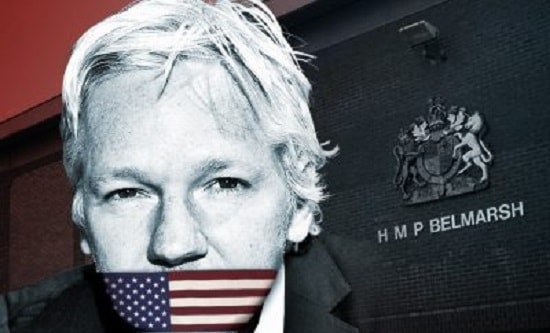
On 17 June Home Secretary Priti Patel formally approved the extradition of Julian Assange to the US, where he faces 18 counts of espionage relating to the publishing of materials that exposed war crimes committed by the US in Iraq and Afghanistan. This comes as no surprise considering Patel’s vicious track record.
The Home Office issued a statement that echoed the rulings of the Court of Appeal that it would not be oppressive or unjust to extradite Assange to the US where, if convicted, he faces up to 175 years in prison. The statement claimed that the extradition would not be ‘incompatible with his human rights, including his right to a fair trial and to freedom of expression’. However, the legal process in Britain around his extradition was marked by extreme bias against Assange and his defence team, as well as several deviations from standard practice at extradition hearings, meaning Assange has already been denied a fair trial by the British courts. He is likely to be further denied a fair trial in the US. The Home Office also claims that he would be treated appropriately in the US with reference to his physical and mental health. Assange has self-harmed while incarcerated at HMP Belmarsh and has reported anxiety and sleep deprivation.
On the day that Patel announced the extradition could go ahead, Assange was strip-searched, taken to a bare cell where he was kept in isolation for several days and denied any visitors. HMP Belmarsh claimed this was for his own safety and to put him on ‘suicide watch’; in reality, it was done to isolate him further and widen the distance between him and those fighting for him.
Throughout this entire case, Assange’s home country of Australia has been noticeably silent. While the Australian Labour Party was in opposition, its leader Anthony Albanese was a signatory to a campaign calling for Assange’s release and even made assurances to Assange’s father John Shipton that he would do what he could to release Assange if elected. However, since Albanese became Prime Minister, after Labour won the federal election on 21 May, he has reneged on these assurances. He told reporters that he will not be pressured into intervening in the case and refused to answer when asked whether he discussed the case with President Biden during talks on 24 May. Australian foreign minister Penny Wong declared that Australia is ‘not a party to Mr Assange’s case’ and cannot intervene in the legal affairs of another country, reaffirming Australia’s willingness to capitulate to US interests, even if it means turning over one of its own citizens.
The British state is not only collaborating with the US by formally allowing the extradition of Julian Assange, but has played a proactive role in the process. The fight is not over yet, however. On 1 July, it was announced that Julian Assange’s legal team had filed an appeal to the High Court and this has delayed the prospect of Assange being extradited to the US for some time. The legal battle for Assange’s release has been a long one and it is likely to continue for much longer. It is unclear when the High Court will hear this appeal, but when it does, the US state and British Home Office will undoubtedly use any tactics they can to push the extradition through, just as has already occurred in the Magistrates Court, Court of Appeal, and Supreme Court in the earlier round of hearings.
The ongoing persecution of Julian Assange is part of the war against independent and free journalism that has been instigated by the imperialist nations. This is why we need to build a movement that will demand the release of Julian Assange and all others who are being persecuted for exposing the crimes of imperialism.
Seamus O’ Tuairisc




